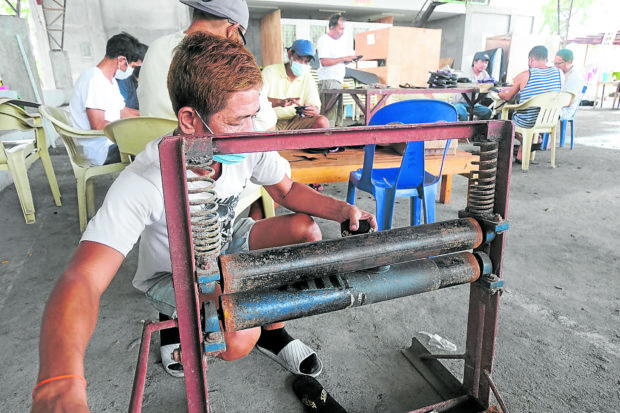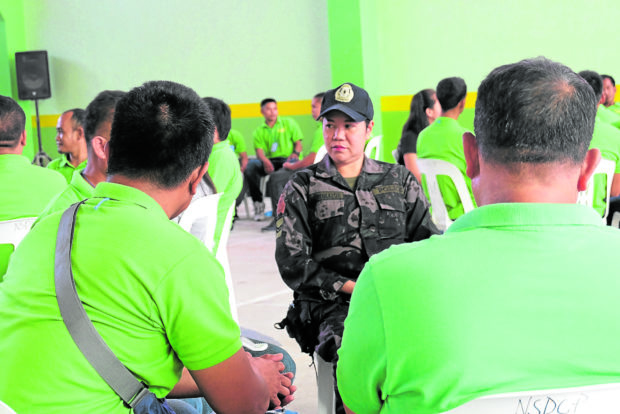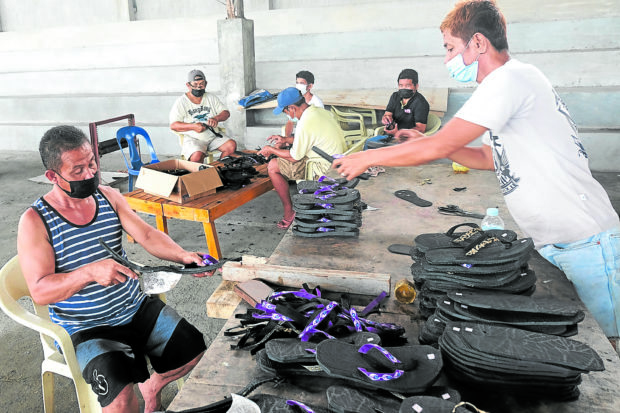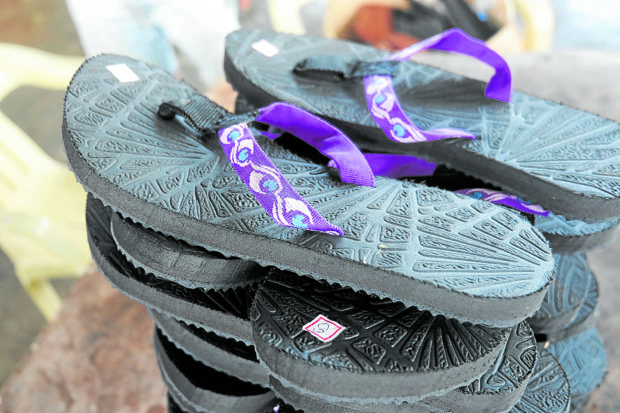In Tacurong, ex-druggies walk away from vice through ‘ismagol’

PRODUCTIVE Rehabilitated drug users in Tacurong City use their time to be productive through a footwear-making venture that is gaining local patronage. For capital, they used the cash assistance coming from the Department of Labor and Employment’s aid program for workers displaced by the pandemic. —PHOTOS BY BONG S. SARMIENTO
TACURONG CITY, Sultan Kudarat, Philippines — After going astray for abusing illegal substances and alcohol, a group of former drug users in this city in Sultan Kudarat province started walking their way back to the mainstream literally with the help of a pair of slippers.
Although “ismagol” may sound negative — as it could be mistaken for “smuggled” in the way an Ilonggo or Hiligaynon speaker pronounces it — more than a dozen persons who used drugs (PWUDs) adopted it as the brand for the slippers they are making.
For these affectionate-speaking Ilonggo PWUDs, ismagol is simply the ubiquitous wearable slippers.
Ma. Rhodora Pauya, village chief of Rajah Muda, said the venture helped the rehabilitated PWUDs not only earn extra income but also, and more importantly, prevent them from slipping back into drug addiction.
“The slippers production also promotes camaraderie among the PWUDs. They eagerly report here after doing their morning farm chores, talking and joking while being productive,” Pauya told the Inquirer.
So, in the past few months, about a dozen former drug addicts have been using the village gymnasium to make these sturdy slippers by hand.

ALL CLEAN Former drug users who underwent rehabilitation in 2019 in Tacurong City have tested negative for traces of illegal drugs. The government ensures that they are slowly integrated into society’s mainstream through counseling and livelihood programs.
Gov’t beneficiaries
They were among the villagers chosen as beneficiaries of the Department of Labor and Employment’s program Tulong Panghanapbuhay sa Ating Disadvantaged/Displaced Workers (Tupad), which provided P5,000 to workers affected by the new coronavirus disease (COVID-19) pandemic.
Some of them have undergone the local Catholic Church-initiated program Tatap, an Ilonggo acronym for “Help Care for Change, Hope and Learning,” while the rest were products of the community-based rehabilitation program.
They started their slippers venture in 2019 which was stopped during the onset of the pandemic. But a few months ago, Pauya broached the idea of reviving their production, using the cash assistance from Tupad.
At least 20 former drug users agreed to pitch in P3,000 each, raising P60,000 for the seed money they used to procure raw materials and restart the venture.
“If they opted to receive all the P5,000 cash aid from the government, [the amount] might have been gone in just a few days,” Pauya said. “But because they appropriated P3,000 each for the slippers venture, they’re seeing something productive and encouraging.”
Besides marketing their slippers as ismagol, the PWUDs also named their group as Ismagol for “Isang Mabuting Gawain O Livelihood,” or (One good thing or livelihood).
To support their venture, the city government of Tacurong vowed to order hundreds of pairs of slippers from the group for its employees, Pauya said.
Mayor Angelo Montilla, who succumbed to COVID-19 early this month, appealed to City Hall employees to buy at least a pair of slippers from the PWUDs out of their midyear bonus.
“Let us support the product of our empowered brethren if we are looking for advocacies amid these challenging times,” he said.
Vice Mayor Lino Montilla, who assumed the post of his deceased older brother, also supported the PWUDs’ slipper venture, allowing them to display their products at the City Hall grounds.

MADE TO LAST Rubber slippers, locally called “ismagol”, are made to last, with its makers in Tacurong City ensuring that every pair that they create from quality materials is sturdy.
Drug-free community
The PWUDs in Rajah Muda, a village populated by Ilonggos, are so far the only ex-drug addicts in the city who have organized themselves to embark on a promising livelihood project.
With a dozen individuals regularly working five days a week, they can produce some 70 pairs of slippers a day. They sell each adult-sized piece at P120 and P80 for children’s sizes.
Authorities earlier identified them through the Duterte administration’s antidrug program called “Tokhang,” or “Toktok Hangyo,” which encouraged identified drug users in local communities to reform.
Barangay Rajah Muda chair Pauya said the village had already been declared drug-free and that they had been strictly monitoring the PWUDs in the village.
Julio Pama, Ismagol secretary, said the slippers venture had been a good way for them to kill time while still being productive.
“More importantly, it keeps us away from the temptation of illegal drugs because we are busy,” the 58-year-old former drug and alcohol user said.

Slippers produced by the rehabilitated drug users in Tacurong City come in different sizes for both sexes.
He assured that their rubber slippers were durable and sturdy, showing off a pair he had worn every day since 2019.
Pama’s slippers showed signs of wear and tear but still looked like it was not about to give up yet.
“Let it air-dry and not directly under the sun,” he advised buyers as he brushed the slippers clean.
Allan Freno, Tacurong information officer, said the local government had been continuously working to connect the former drug users with national government agencies, hoping for additional aid that would help the group go into mass production.
“To date, the PWUDs in Rajah Muda are the sterling example of a sustainable postdrug rehabilitation intervention in our city,” he said.
“Our dream is for them to establish a factory, one that can compete with the big companies,” Freno added.














